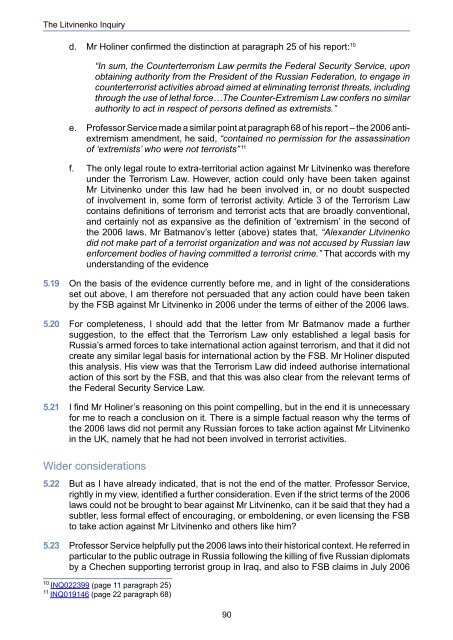The Litvinenko Inquiry
JIEp7Zyr
JIEp7Zyr
You also want an ePaper? Increase the reach of your titles
YUMPU automatically turns print PDFs into web optimized ePapers that Google loves.
<strong>The</strong> <strong>Litvinenko</strong> <strong>Inquiry</strong><br />
d. Mr Holiner confirmed the distinction at paragraph 25 of his report: 10<br />
“In sum, the Counterterrorism Law permits the Federal Security Service, upon<br />
obtaining authority from the President of the Russian Federation, to engage in<br />
counterterrorist activities abroad aimed at eliminating terrorist threats, including<br />
through the use of lethal force…<strong>The</strong> Counter-Extremism Law confers no similar<br />
authority to act in respect of persons defined as extremists.”<br />
e. Professor Service made a similar point at paragraph 68 of his report – the 2006 antiextremism<br />
amendment, he said, “contained no permission for the assassination<br />
of ‘extremists’ who were not terrorists” 11<br />
f. <strong>The</strong> only legal route to extra-territorial action against Mr <strong>Litvinenko</strong> was therefore<br />
under the Terrorism Law. However, action could only have been taken against<br />
Mr <strong>Litvinenko</strong> under this law had he been involved in, or no doubt suspected<br />
of involvement in, some form of terrorist activity. Article 3 of the Terrorism Law<br />
contains definitions of terrorism and terrorist acts that are broadly conventional,<br />
and certainly not as expansive as the definition of ‘extremism’ in the second of<br />
the 2006 laws. Mr Batmanov’s letter (above) states that, “Alexander <strong>Litvinenko</strong><br />
did not make part of a terrorist organization and was not accused by Russian law<br />
enforcement bodies of having committed a terrorist crime.” That accords with my<br />
understanding of the evidence<br />
5.19 On the basis of the evidence currently before me, and in light of the considerations<br />
set out above, I am therefore not persuaded that any action could have been taken<br />
by the FSB against Mr <strong>Litvinenko</strong> in 2006 under the terms of either of the 2006 laws.<br />
5.20 For completeness, I should add that the letter from Mr Batmanov made a further<br />
suggestion, to the effect that the Terrorism Law only established a legal basis for<br />
Russia’s armed forces to take international action against terrorism, and that it did not<br />
create any similar legal basis for international action by the FSB. Mr Holiner disputed<br />
this analysis. His view was that the Terrorism Law did indeed authorise international<br />
action of this sort by the FSB, and that this was also clear from the relevant terms of<br />
the Federal Security Service Law.<br />
5.21 I find Mr Holiner’s reasoning on this point compelling, but in the end it is unnecessary<br />
for me to reach a conclusion on it. <strong>The</strong>re is a simple factual reason why the terms of<br />
the 2006 laws did not permit any Russian forces to take action against Mr <strong>Litvinenko</strong><br />
in the UK, namely that he had not been involved in terrorist activities.<br />
Wider considerations<br />
5.22 But as I have already indicated, that is not the end of the matter. Professor Service,<br />
rightly in my view, identified a further consideration. Even if the strict terms of the 2006<br />
laws could not be brought to bear against Mr <strong>Litvinenko</strong>, can it be said that they had a<br />
subtler, less formal effect of encouraging, or emboldening, or even licensing the FSB<br />
to take action against Mr <strong>Litvinenko</strong> and others like him?<br />
5.23 Professor Service helpfully put the 2006 laws into their historical context. He referred in<br />
particular to the public outrage in Russia following the killing of five Russian diplomats<br />
by a Chechen supporting terrorist group in Iraq, and also to FSB claims in July 2006<br />
10<br />
INQ022399 (page 11 paragraph 25)<br />
11<br />
INQ019146 (page 22 paragraph 68)<br />
90


